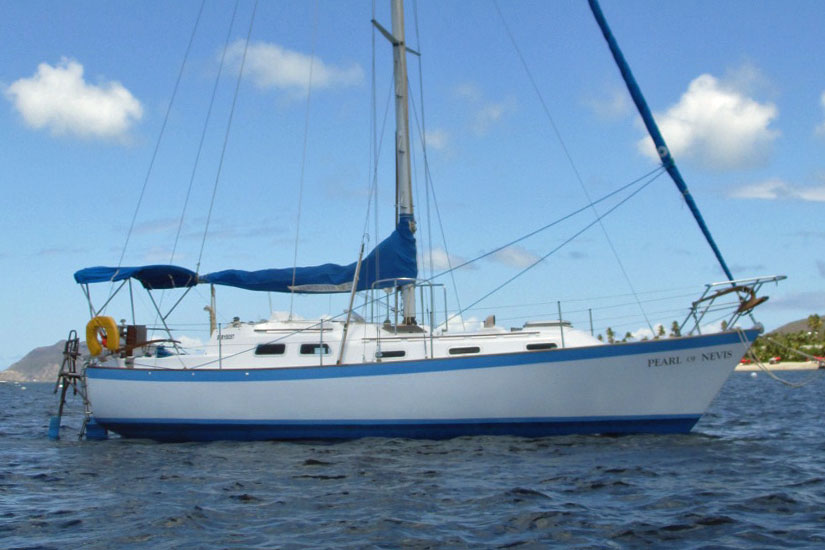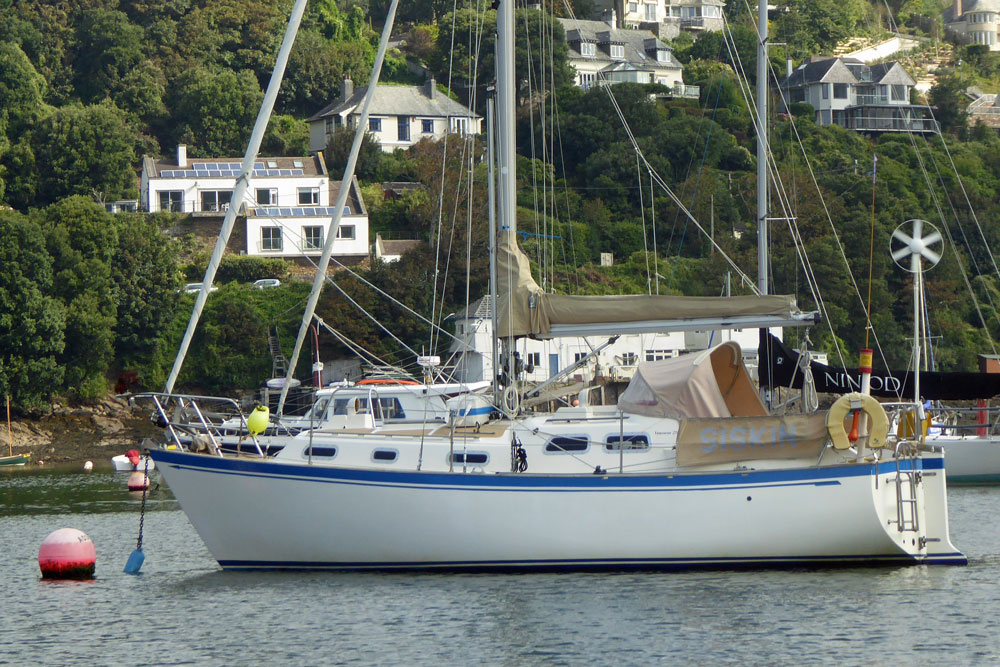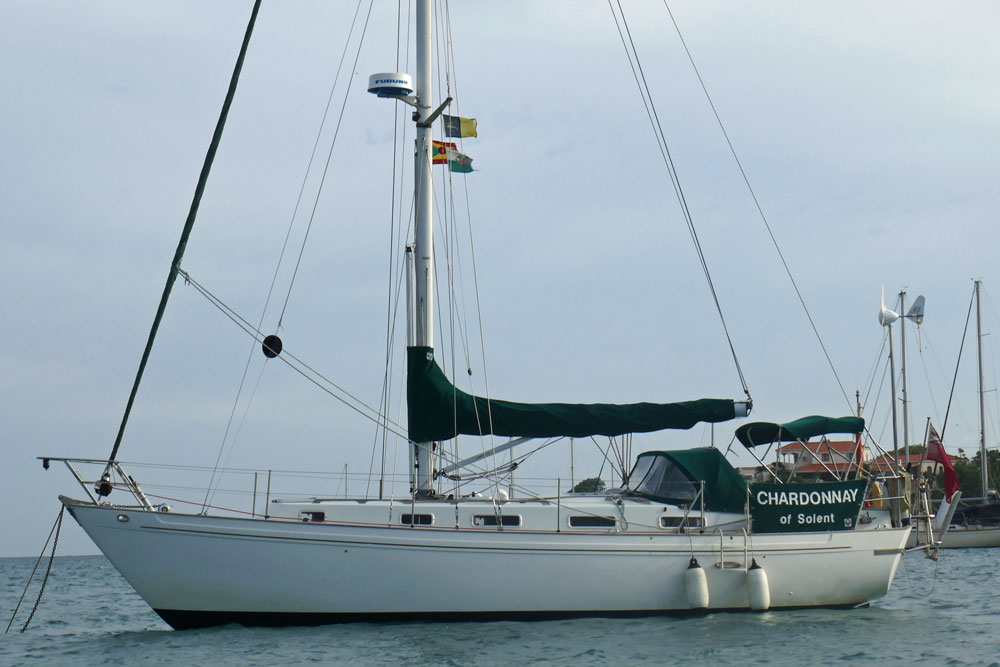- Home
- Cruising Yachts 30' to 35'
- Vancouver 32
The Vancouver 32 Sailboat
Specs & Key Performance Indicators
The Vancouver 32, a long-keeled cutter, was designed by Robert Harris and built in the UK by Pheon Yachts and Northshore Yachts.
 The Vancouver 32 cutter, a highly regarded sailboat for long distance sailing
The Vancouver 32 cutter, a highly regarded sailboat for long distance sailingPublished Specification for the Vancouver 32
Underwater Profile: Long fin keel with transom-hung rudder
Hull Material: GRP (Fibreglass)
Length Overall: 32'0" (9.8m)
Waterline Length: 27'6" (8.4m)
Beam: 10'7" (3.2m)
Draft: 4'6" (1.4m)
Rig Type: Cutter
Displacement: 14,500lb (6,577kg)
Designer: Robert Harris
Builder: Pheon Yachts (UK) and Northshore Yachts (UK)
Year First Built: 1986
Year Last Built: 1991
Number Built: 63
Owners Association: Vancouver Yachts Association
Published Design Ratios for the Vancouver 32
1. Sail Area/Displacement Ratio: 15.9
2. Ballast/Displacement Ratio: 42.9
3. Displacement/Length Ratio: 301
4. Comfort Ratio: 32.4
5. Capsize Screening Formula: 1.8
A Few FAQs...
Based on the published Design Ratios for the Vancouver 32, how would you expect the boat to perform under sail?
Based on the published Design Ratios for the Vancouver 32, how would you expect the boat to perform under sail?
The Vancouver 32 has a low Sail Area/Displacement Ratio of 15.9, which means it is under-powered and needs a good breeze to get moving. It also has a high Ballast/Displacement Ratio of 42.9, which means it is stiff and stable in strong winds. It has a heavy Displacement/Length Ratio of 301, which means it is not very fast or agile, but can carry a lot of weight and handle rough seas. It has a moderate Comfort Ratio of 32.4, which means it has a reasonable motion in a seaway, but not as smooth as some other boats. It has a low Capsize Screening Formula of 1.8, which means it is less likely to capsize than some other boats.
Is the Vancouver 32 still in production and, if not, when did production end and how many of these sailboats were built?
Is the Vancouver 32 still in production and, if not, when did production end and how many of these sailboats were built?
The Vancouver 32 is no longer in production. The last boat was built in 1991. According to Sailboat Guide, 63 boats were built in total.
What, if any, alternative versions of the Vancouver 32 were built and what are the differences between them?
What, if any, alternative versions of the Vancouver 32 were built and what are the differences between them?
There were two main versions of the Vancouver 32: the standard version and the pilothouse version. The pilothouse version had a raised deckhouse that provided more headroom and visibility in the saloon. It also had different engine options and a slightly different layout. Some pilothouse models were built in Taiwan for the US market, while others were built in the UK for the European market.
How many people can sleep on board a Vancouver 32?
How many people can sleep on board a Vancouver 32?
The Vancouver 32 can sleep up to six people in three cabins: a double berth in the forward cabin, two single berths in the quarter cabin, and two single berths in the saloon.
What do owners of the Vancouver 32 have to say about their boats?
What do owners of the Vancouver 32 have to say about their boats?
Owners of the Vancouver 32 tend to be very satisfied with their boats, especially for long-term cruising and living aboard. They appreciate the boat's solid construction, spacious interior, ample storage, easy handling, and good performance in various conditions. They also enjoy the boat's classic looks and charm.
What is the history of the builders of the Vancouver 32 and is the company still in business?
What is the history of the builders of the Vancouver 32 and is the company still in business?
The Vancouver 32 was built by several different yards over the years. The original builder was Pheon Yachts Ltd., a British company founded by John Butler in 1978. Pheon Yachts also built other models in the Vancouver range, such as the Vancouver 27 and the Vancouver 36. Pheon Yachts ceased trading in 1991 due to financial difficulties.
Another builder was Ta Yang Yacht Building Co. Ltd., a Taiwanese company that was established in 1973. Ta Yang Yacht built some pilothouse models of the Vancouver 32 for the US market, as well as other well-known boats such as the Tayana 37 and the Tayana 42. Ta Yang Yacht is still in business today and continues to produce high-quality yachts.
A third builder was Northshore Yachts Ltd., another British company that was founded in 1971. Northshore Yachts took over from Pheon Yachts in 1991 and built some more standard and pilothouse models of the Vancouver 32 for the European market.
Northshore Yachts also built other models in the Vancouver range, such as the Vancouver 28 and the Vancouver 34. Northshore Yachts merged with Southerly Yachts Ltd. in 2010 and became part of Discovery Yachts Group Ltd., which is still operating today.
What is the average cost of a secondhand Vancouver 32?
What is the average cost of a secondhand Vancouver 32?
The average cost of a secondhand Vancouver 32 depends on the condition, age, location, and equipment of the boat. According to YachtWorld, the current asking prices for Vancouver 32s range from £29,950 to £49,950, with an average of £39,450.
How does the Vancouver 32 compare to other sailboats in its class?
How does the Vancouver 32 compare to other sailboats in its class?
The Vancouver 32 is comparable to other sailboats in its class that are designed for long-distance cruising and living aboard, such as the Westsail 32, the Albin Vega 27, the Contessa 32, and the Nicholson 31. The Vancouver 32 has some advantages over these boats, such as its larger interior space, its cutter rig, and its pilothouse option. It also has some disadvantages, such as its lower speed, its higher price, and its limited availability.
What other sailboats have been created by the designer of the Vancouver 32?
What other sailboats have been created by the designer of the Vancouver 32?
The designer of the Vancouver 32 is Robert B. Harris, a Canadian naval architect who has created many other sailboats for various builders and clients. Some of his other designs include the Tayana 37, the Baba 30, the Panda 38, the Norstar 40, and the Passport 40. He is also known for his work on multihulls, such as the Harris Trimaran and the Harris Catamaran. He is currently based in Seattle, Washington.
The above answers were drafted by sailboat-cruising.com using GPT-4 (OpenAI’s large-scale language-generation model) as a research assistant to develop source material; to the best of our knowledge, we believe them to be accurate.
Other sailboats in the Vancouver range include:
Recent Articles
-
Beneteau Oceanis 331 Clipper Review: Specs, Performance & Ratios
Feb 04, 26 07:25 PM
A comprehensive review of the Beneteau Oceanis 331 Clipper sailboat. We analyse design ratios, interior layout, and performance for prospective cruising owners. -
Self-Tacking Headsails: Track Systems vs Hoyt Jib Booms
Feb 03, 26 06:26 AM
Master the mechanics of self-tacking headsails. We compare traditional club-footed rigs, curved tracks, and the superior Hoyt Jib Boom for offshore sailing. -
Catalina 42 mk1 Review: Specs, Performance & Cruising Analysis
Feb 01, 26 06:35 AM
An in-depth review of the Catalina 42 mk1 sailboat. Explore technical specifications, design ratios, and practical cruising characteristics for this iconic cruiser.

